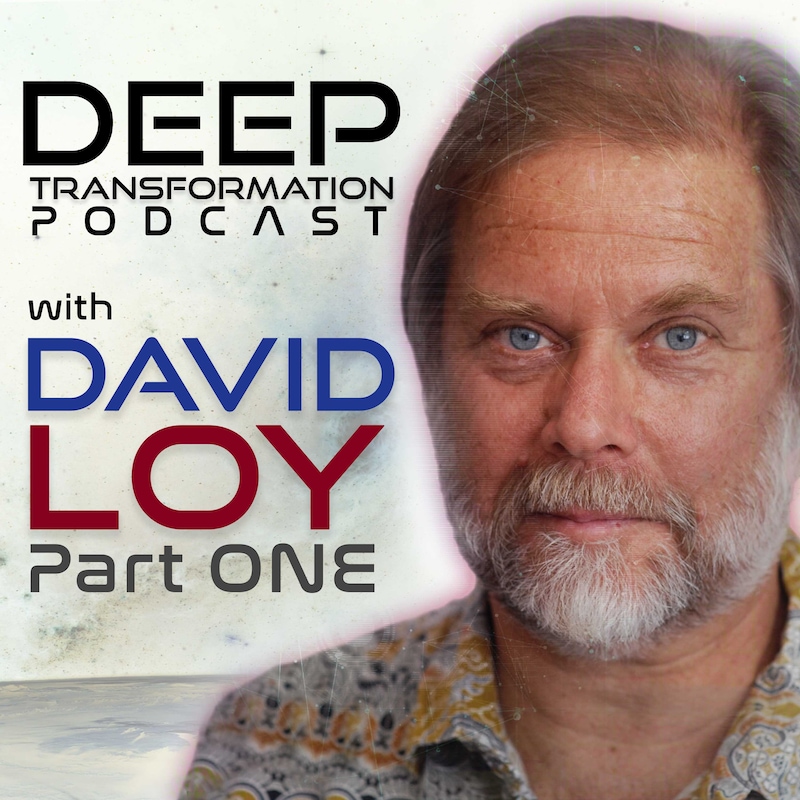Ep. 27 (Part 1 of 2) | David Loy, Zen teacher, scholar, and prolific author, reveals his acute understanding of the crises we face today, the psychology at the root of the problems, and how we can make our way forward in this in-depth discussion. He has adopted the term ecodharma to focus attention on the challenge Buddhism faces now: integrating personal transformation with global activism and social transformation. As David points out, the focus needs to be on this world, with transcendence being a metaphorical understanding but not an excuse to abandon the problems we and our planet face today.
Besides gaining great depth of knowledge from being a scholar and student of koans, David’s insights come from a plethora of nondual experiences, which led David on a path of eco-action. Ecodharma asks: How does Buddhism need to change? How much is dwelling in emptiness becoming problematical in these challenging times? What’s best for the Earth? Everyone says practice, practice, practice…when is the performance? Is evolutionary pressure going to create a new way of living sustainably? Recorded February 22, 2020.
“When your sense of separation dissipates, it becomes not what’s in it for me, but what can I do to help make this a better world for everybody?”
Note: This podcast was recorded live and includes, at times, some extraneous noises in the background. Please excuse them -- we felt the conversation was very valuable and well worth sharing with our audience. We hope you enjoy it as much as we do.
(For Apple Podcast users, click here to view the complete show notes on the episode page.)
Topics & Time Stamps - Part 1
- Social activism, Zen practice, philosophy, koan study: how it all started (03:52)
- How does David’s Zen practice inform his activism? It was the experiences of nondual reality (05:48)
- The emergence of compassion: when your sense of separation dissipates, it becomes not what’s in it for me, but what can I do to help make this a better world for everybody (09:14)
- The cold civil war in the U.S. and the need to find a way to talk with each other and understand conflicting points of view (12:03)
- Our fundamental problem is that we don’t feel real, because the separate self is a construct, inherently insecure, inherently uncomfortable, and we experience this as a sense of fundamental lack (14:03)
- The psychological and sociological implications of this sense of lack and how society is constructed to take advantage of it: the contemporary world religion is consumerism (17:31)
- The positive and negative sides of individualism (22:23)
- The heart of the bodhisattva path: personal transformation and social transformation (24:57)
- The challenge of integrating nondual experiences (27:31)
- 3 elements of the Pali Canon’s Motivation for Awakening (28:31)
- Dukkha (suffering) is structural not just individual (30:09)
- Awakenings: transcendent, imminent, and the decline of Axial religions that devalue this world (36:26)
- The problem with mindfulness and the 3 poisons: greed, ill will, delusion (40:51)
Resources & References - Part 1
- David Loy, EcoDharma: Buddhist Teachings for the Ecological Crisis*
- David Loy, NonDuality: In Buddhism and Beyond*
- David Loy, co-editor, A Buddhist Response to the Climate Emergency*
- Full list of David’s writings: https://www.davidloy.org/writing.html
- David Loy’s website
- David Loy, co-founder of the Rocky Mountain Ecodharma Retreat Center
- Yamada Kōun Roshi, David's teacher and author of The Gateless Gate : The Classic Book of Zen Koans* (2004)
- Robert Aiken, one of the original founders of the Buddhist Peace Fellowship
- Dōgen, Japanese Buddhist priest, poet, philosopher, and founder of the Sōtō school of Zen
- William Blake, poet, painter, mystic
- Ernest Becker, The Denial of Death*
- Mahatma Gandhi, “The world has enough for everyone’s need…”
- Theravada sutras, the Pali Canon, Bodhipakkhiya Dhamma
- Aldous Huxley, Island*
- Dogen’s Genjokoan, Actualizing the Fundamental Point
- Loyal Rue, Everybody’s Story: Wising up to the Epic of Evolution*
- Naomi Klein, This Changes Everything: Capitalism vs the Climate*
- Stockholm Institute’s 9 markers of ecological sustainability
* As an Amazon Associate, Deep Transformation earns from qualifying purchases.
---
Early on, David Loy studied koans under Yamada Kōun Roshi while teaching Eastern and Western philosophy in Japan. He began to have direct experiences of nonduality, and the recognition of unity, or connection with others, led to his activism in the spheres of social justice and the eco-crisis. A scholar, professor, and Zen teacher in the Sanbo Zen tradition, David brings a Buddhist perspective to the ecological crisis we face today. He points out there is an important parallel between what Buddhism says about our personal predicament and about our collective predicament in relation to the rest of the biosphere. David is also a prolific author; his latest book is Ecodharma: Buddhist Teachings for the Ecological Crisis; and he is co-editor of A Buddhist Response to the Climate Emergency.
---
Podcast produced by Vanessa Santos and Show Notes by Heidi Mitchell





